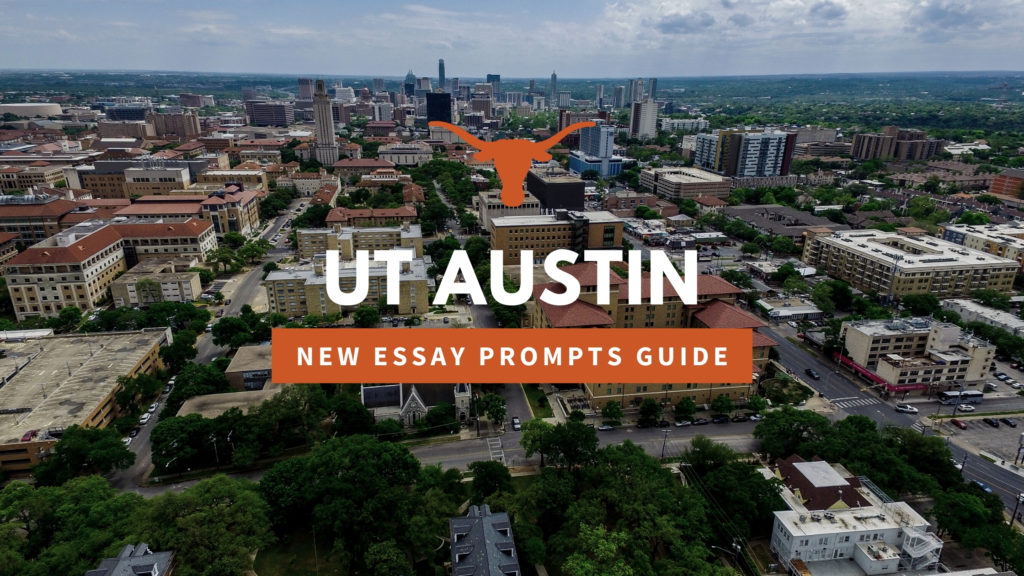In a surprise move this summer, the University of Texas Austin changed their supplemental essay prompts. They added two new prompts, and combined two of their previous questions, resulting in students needing to write four essays. The abruptness of this change, and a lack of prior announcement, caused a great deal of shock for students.
So why did UT Austin make this change, and how should you try to answer these questions? While we can’t answer the first question, we can help you with the second. In this article, we’ll discuss the new prompts, give examples of how you can answer them, and show you what UT Austin is looking for when they ask these questions.
We have a guide to answering supplemental essay questions generally, but due to the importance of UT Austin for many of our students, we thought it would be helpful to address these changes specifically.
“Change the World” Example
The core purpose of The University of Texas at Austin is, “To Transform Lives for the Benefit of Society.” Please share how you believe your experience at UT-Austin will prepare you to “Change the World” after you graduate. (250-300 words)
Because my goal is creating a life changing invention, I believe UT’s unique engineering program and focus on experiential learning will best prepare me for the future. As a biomedical engineering major, I’m eager to take advantage of opportunities to do research as an undergrad and potentially solve real world problems. One UT initiative that is perfect to help me accomplish my goals is the Inventors Program, which teaches entrepreneurial design and will help me make an immediate community impact.
Another aspect of UT engineering that excites me is the Senior Design project, a year-long course that allows students to design prototypes based on authentic biomedical engineering problems. While visiting my family in Honduras, I have seen firsthand the need for unique solutions to common healthcare problems. With resources like the Texas Inventionworks Makerspace, I hope to leverage my strong math and science background as well as my love of creativity to solve problems that are impacting the people I love.
In addition to the strong academics UT offers and their top-ranked engineering school, I was thrilled to learn that UT has a chapter of the Best Buddies program, and I plan to get involved immediately. In this program, peer buddies are paired with students with Intellectual or Developmental Disabilities and spend time together throughout the year. I have been lucky enough to be a peer buddy and eventually the president of the local Best Buddies chapter at my high school. I expect the UT chapter will continue to fuel this passion.
UT will prepare me for a successful career, allow me to continue my love of volunteering with individuals with special needs, and help me achieve my goal of creating my own medical device. Me and UT are the kind of dream team that can change the world.
“Change the World” Analysis
This question is, quite frankly, a lot. Unlike many other essay questions that colleges ask, it is hard to single out what exactly UT Austin is looking for when they pose this question. Of course some colleges delight in asking purposefully hard-to-answer questions (looking at you UChicago), but this does not seem to follow in that vein. Instead, this question simply does not read as well thought out.
The goal of college essays generally is for schools to learn about a student; who they are, what they’ve done, and how they can contribute to campus. This question seems to be asking how you will contribute to campus, and to society at large, through what UT Austin gives you.
Therefore, the easiest way we have found to answer this question is as a “Why Us” essay. These essays are quite popular, and inquire why a student wants to attend this school in particular. While you can attempt to divine enough of the future to describe your post-graduation career, we do not recommend doing so.
In the example above, the student clearly discusses why they wish to attend UT Austin, and what the school’s specific programs will allow them to accomplish. The author discusses several programs, and provides clear examples of why they like these programs in particular.
The specificity of examples is important here; there are many schools with good engineering programs, but only UT Austin has the Inventors Program or the Texas Inventionworks Makerspace. The more concretely you tie your desires to the specific offerings of UT Austin, the more convincing your essay will be.
The author also discusses a non-academic draw to UT Austin. You don’t need to include one of these, but it can help make your essay more personal, and show the breadth of your interests. Mentioning specific clubs also shows you’ve done your research on the school; admissions officers like to see that you take their school seriously. We recommend not discussing the school’s city or location generally, as this is too generic and non-specific to the institution.
While this is not the easiest question to answer, by treating it as a “Why Us” essay, you will be well equipped to answer the prompt, and tell UT Austin something important about you in the process. Remember that this essay is not just for singing the praises of the school, but discussing why specific aspects of UT Austin appeal to you, and how their unique offerings will allow you to succeed, and change the world.
Academic Interruptions Essay
Please share background on events or special circumstances that you feel may have impacted your high school academic performance, including the possible effects of COVID-19. (250-300)
Even though my junior year was going to be virtual, I was excited to return to school and some sense of normalcy. I had a full schedule, with a mix of AP and IB classes, and hoped my teachers would be as effective through Microsoft Teams as they were in-person. Being at the height of the presidential election season, I was especially looking forward to AP Government class discussions.
It was my teacher’s first year at Lamar, but he seemed excited to teach the course and wanted lots of class interaction — a nice change from sitting behind the screen in silence. Unfortunately, after six weeks of school, the teacher abruptly quit. The administrators told us he did not enjoy teaching over an online platform. The class was upset that he couldn’t at least finish our semester. Many of us did not enjoy learning virtually, but we all pushed through for the rest of the year. In typical Lamar fashion, not having enough time to arrange a replacement, they introduced us to our new teacher: the football coach. It was a dreadful semester filled with incomprehensible powerpoints and fill-in-the blank worksheets. Most people successfully completed the class without having to unmute their microphone once. The class transformed from an experience I enjoyed to a grating waste of time. Countless emails were sent by many students and parents requesting a different teacher, but all were dismissed. The coach did not want to teach us; therefore the students did not want to listen. Worst of all, his poorly composed lessons were killing everyone’s desire to learn. I tried to stay motivated and teach myself as much as possible but, as you can imagine, a coach reading powerpoints to a class of 64 people left us completely unprepared for the AP test.
Academic Interruptions Analysis
While this question is more straightforward than the other, that does not necessarily make it easier to answer. Last year, UT Austin had a version of this question as an optional prompt, as did the Common App. We touched on these, and writing about Covid 19 generally, before.
This prompt, however, is mandatory. We do not understand this decision, as the students who suffered notable academic setbacks already had a place to discuss these, and students without them had no cause for concern. Now, all applicants will have to write about stumbling blocks, which leads immediately to a problem.
Not all students have suffered academic setbacks or struggles in high school. This is normal, some students struggle more than others; thus an optional essay on academic challenges makes sense. By making this question mandatory, UT Austin seems to penalize students who have not suffered any academic struggles at all during their studies.
Of course, due to the ongoing effects of the pandemic, most every student will be able to write about some kind of academic interruption they suffered, be it virtual classes, AP test issues, or SAT and ACT cancellations. This is what the author does in the example above.
While the author’s setback is not major in terms of grades, a rough course, especially when it impacts an AP exam as well, is notable. This story is far from unique, but the context it provides for the student’s academic achievement is important. While you don’t have to report low AP scores, colleges will still see that you took an AP class, and not reporting an associated score will often make them assume you either felt unprepared for the test, or you did poorly on the test.
While this essay would not be worth including in the additional information section under normal circumstances, the new prompt from UT Austin gives it a place to live. Notable as well is the author’s clear desire to continue learning, and attempts to remedy their situation, though they proved futile. Colleges like to see that you have shown initiative when pursuing your education, especially in the face of setbacks.
While you may not have a great story to tell here, or a particularly original one, that doesn’t mean you can’t answer this prompt. When doing so, avoid giving too many excuses. Instead explain what happened, how it impacted you, and what you did about it. You should always focus on the third step if possible, as your actions demonstrate your drive and capabilities.
Final Thoughts
College essays are always a challenge to write, and even more of one when they are unexpected. While UT Austin’s new essays caught many students by surprise, we hope that these examples will help you when trying to answer them. The unfortunate truth of college admissions is that universities have far more power than students in the relationship, and they get to set the terms for how the process works.
If you want more individualized guidance when writing your essays, or have further concerns about your admissions journey, schedule a free consultation with us. We have deep experience helping students get into their dream schools, and are always happy to share what we know.








